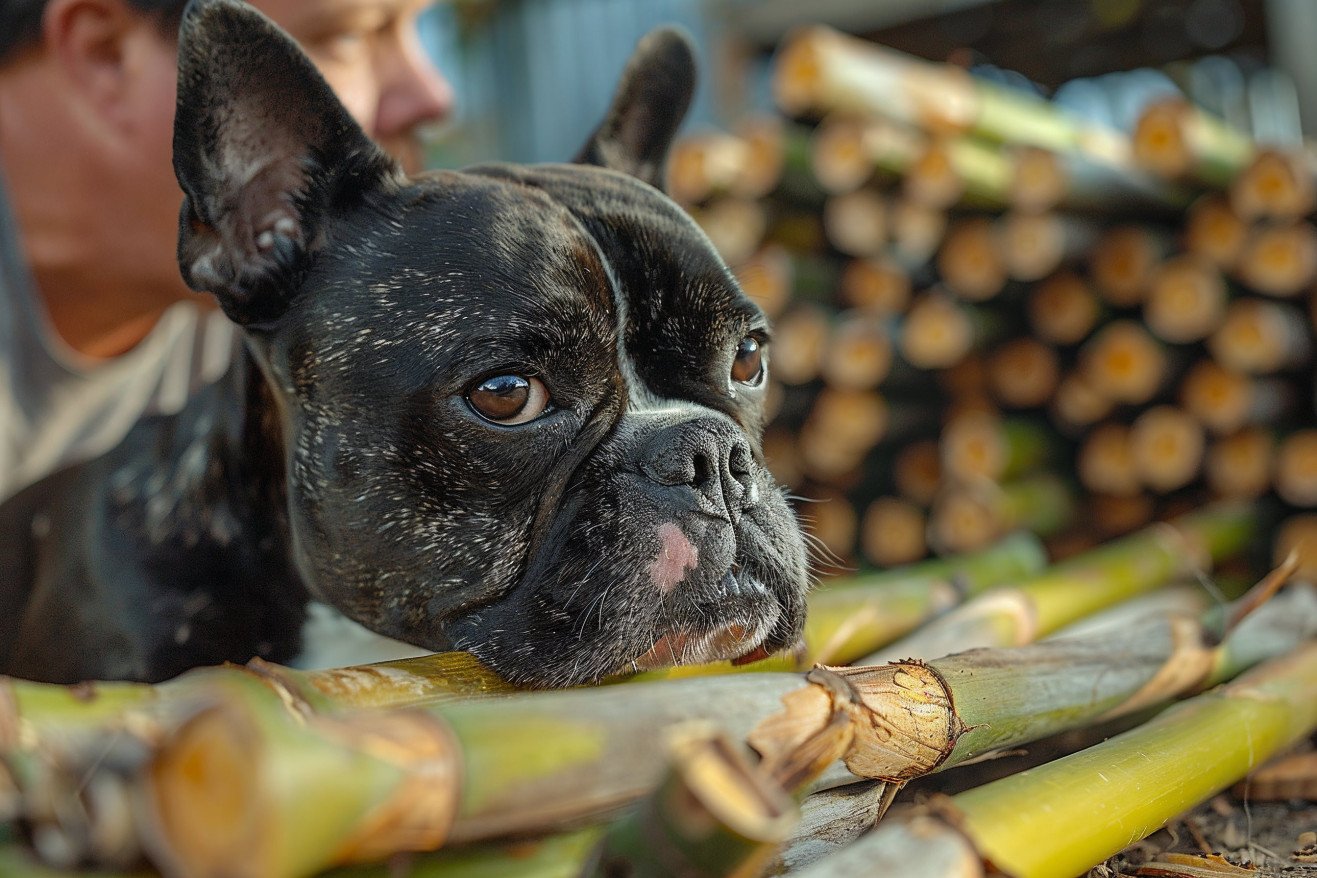Can Dogs Eat Sugar Cane? The Sweet Truth
22 May 2024 • Updated 22 May 2024

If you’ve ever seen sugar cane growing in the wild, you’ve probably wondered if your dog can eat it. After all, it’s sweet and fibrous, and it seems like it would be a fun snack for your pup. The truth is that dogs can eat sugar cane, but there are a few things you should consider before you let them try it.
As long as the sugar cane is peeled and the fibrous, woody parts are removed, it’s safe to give to your dog. However, because it’s high in sugar, it should be fed in moderation and avoided if your dog is diabetic or overweight.
While sugar isn’t poisonous to dogs, it can cause the same problems in your pet as it does in you if it’s eaten in large amounts. This article will cover the most recent information from veterinarians about the benefits, risks, and how to feed your dog sugar cane. By learning about the nutritional content of sugar cane and how much you can safely feed your dog, you can decide if it’s a good choice for an occasional treat.
Can dogs eat sugar cane?
Potential Risks of Giving Dogs Sugar Cane
There are several potential risks associated with giving dogs sugar cane that pet parents should consider. The high sugar and fiber content in sugar cane can cause gastrointestinal upset, including vomiting, diarrhea, and stomach upset, says Modern Vet. In addition, the high sugar content in sugar cane can lead to obesity, dental issues such as tooth decay, and an increased risk of diabetes in dogs, according to PetMD.
The tough, fibrous nature of sugar cane stalks can also pose a choking hazard and may cause intestinal blockages or obstructions if not properly prepared, notes Animal Gator. Dogs with certain health issues such as diabetes or pancreatitis should not be given sugar cane due to its high sugar content, which can make their conditions worse. In addition, some dogs may be more susceptible to gastrointestinal upset or weight gain from the high-sugar, high-fiber content of sugar cane.
Although an occasional nibble may not be dangerous for most healthy dogs, the potential risks of giving dogs sugar cane on a regular basis or in large quantities often outweigh the minimal benefits. While removing the fibrous parts and feeding sugar cane in moderation can help prevent more serious issues, it’s best to avoid giving dogs sugar cane and opt for safer treats. This highlights the importance of evaluating the nutritional value of sugar cane before giving it to your dog.
Nutritional Concerns and Potential Benefits
Sugar cane is not toxic to dogs, but because of its high sugar content, it should only be given to dogs in small amounts as an occasional treat, according to Sugar Cane Is Not Toxic To Dogs. Sugar cane may help with digestion, boost the immune system, and clean teeth because of its fibrous texture, according to Sugar cane and dogs: what you should know. For dogs, raw, organic sugar cane may be better than processed or refined sugar cane products.
In addition, dietary fibers from ingredients like sugar cane can be used to help manage overweight, obesity, and diabetes in dogs when formulated properly, according to Sugarcane fiber pet food ingredient made by partnership. However, the potential dangers of sugar cane likely make the minor nutritional benefits it offers not worth it for most dogs, as the high sugar content can still cause health problems.
Because of the mixed nutritional value of sugar cane, it's important to consider the right serving size and preparation when giving it to dogs as an occasional treat. It's also important to make sure that the proper guidelines and safety measures are in place to reduce the potential health risks.
How to Prepare and Serve Sugar Cane to Dogs
Sugar cane stalks need to be peeled and rid of any hard, fibrous parts before giving them to dogs to avoid digestive blockages, says Sugar cane and dogs: what you should know. Dogs should only be given the soft, inner part of the sugar cane stalk, and it should be cut into small, bite-sized pieces. Sugar cane leaves and tops should be steered clear of since they could be toxic or harder for dogs to digest, according to Can Dogs Eat Leaves?.
It’s important to remember that sugar cane should be fed in moderation, and it should never account for more than 10% of a dog’s daily caloric intake, notes Sugar cane and dogs: what you should know. Plus, it’s important to brush a dog’s teeth after giving them sugar cane to remove any sugar that may be left behind and prevent cavities. By following these preparation and serving tips, you can help reduce the potential health concerns associated with giving sugar cane to dogs.
Special Health Conditions to Keep in Mind
Diabetic dogs should steer clear of sugar cane entirely since its high sugar content can cause a dangerous spike in blood sugar levels, according to The Best Kinds of Treats For Diabetic Dogs. Diets for diabetic dogs should be low-carb, high-fiber diets with appropriate protein levels to help control blood sugar, says the Clinical Nutrition Service at Cummings School.
Dogs with sensitive stomachs or digestive issues may have trouble with sugar cane’s high fiber content, according to Feeding Dogs With Diabetes on PetMD. Overweight or obese dogs should be careful about eating sugar cane to avoid gaining more weight and the health issues that come with it, says WebMD. Some breeds may be more susceptible to diabetes or obesity, which can make sugar cane an even riskier treat, according to Modern Vet.
Because of these potential issues, it’s important for dog owners to talk to a vet before giving sugar cane or any new treat to their dog, especially if their dog has a health condition. Safer, low-sugar treats may be a better way to indulge their sweet tooth without putting their health at risk.
Healthier Alternatives to Sugar Cane for Dogs
Although sugar cane can be a fun and occasional treat, there are healthier and more nutritious ways to give your dog something sweet. The American Kennel Club says that fruits like apples, bananas, and berries can be a source of natural sweetness and important nutrients for dogs. The AKC also explains that vegetables like carrots and sweet potatoes can be a source of sweetness and fiber for dogs.
Meanwhile, while it should be given in small amounts, honey and unsweetened peanut butter can be a source of healthy sweetness for most dogs, according to Can Dogs Eat Sugar? Truth vs. Myth on Pet Parenting. That said, Hepper says that even "safe sugars" should be given in moderation. The Hepper article also explains that it's important to introduce any new treats slowly and to ask a vet for personalized dietary advice.
By trying out these healthier, more nutritious sweet treat options, dog parents can give their furry friends the sweet taste they crave without the potential downsides of sugar cane.
Conclusion: Sugar Cane Should Be Fed to Dogs in Moderation
Sugar cane is not poisonous to dogs, but its high sugar and fiber content mean that it should only be fed to dogs in moderation. The potential health problems, such as obesity, dental issues, and digestive upset, often outweigh the minimal nutritional value that it offers.
Dogs with certain health issues, such as diabetes or weight problems, should not be fed sugar cane at all. It is also important to ensure that the proper preparation and serving methods are used to avoid digestive blockages and other issues. In general, other sweet treats that are safer and more nutritious, such as certain fruits and vegetables, are a better option for most dogs.


